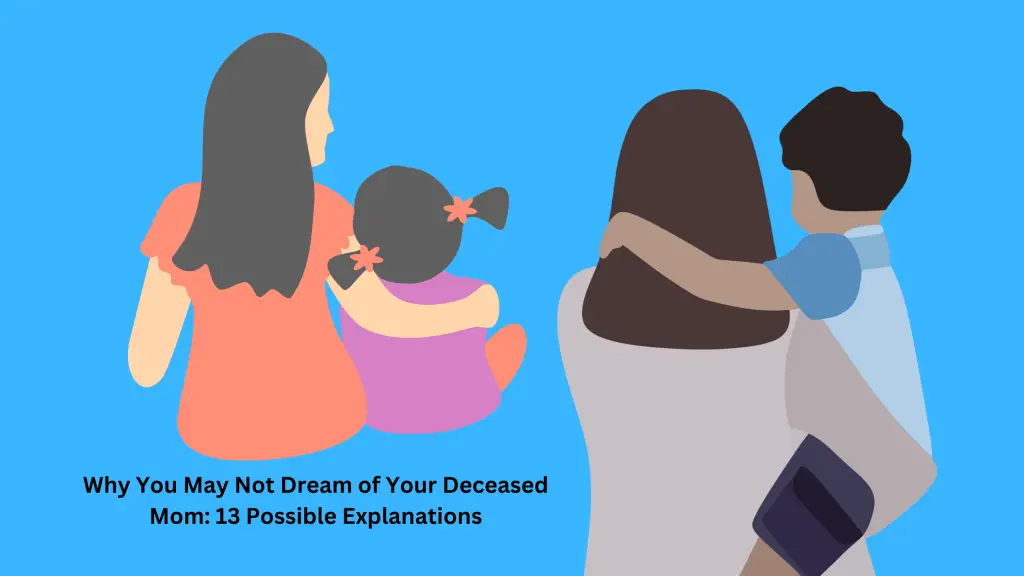
You don’t dream of your deceased mom usually related to the complicated process of grieving.
For most people, dreaming of a deceased loved one can be a comforting experience, but it can also be distressing.
The absence of dreams about a deceased loved one can be equally confusing and upsetting.
Grief is a complex and individual process that affects people in different ways.
Losing a loved one can lead to a range of emotions, including sadness, anger, guilt, and confusion.
Dreams can be a way to process these emotions, but they are not the only way. Some people may find comfort in talking to friends and family, seeking professional help, or engaging in activities that bring them joy.
Why Don’t You Dream of Your Deceased Mom?
The Science Behind Dreams
Dreams are a natural part of the sleep cycle. They occur during the Rapid Eye Movement (REM) stage of sleep, which happens multiple times throughout the night.
During this stage, the brain is highly active and creates images, sounds, and sensations that are often unrelated to the real world.
Dreams can be influenced by a variety of factors, including emotions, memories, and experiences.
Factors That Affect Dreaming
There are several factors that can affect a person’s ability to dream of a deceased loved one, including:
- Health: Certain medications or health conditions can affect the quality of sleep and the ability to dream.
- Emotions: Strong emotions, such as grief, can affect the content of dreams and make it harder to dream of a deceased loved one.
- Grief dreams: Some people experience dreams that are specifically related to their grief and can provide comfort or guidance.
- Guidance: Dreams can provide guidance or reassurance to those who are grieving.
- Reassurance: Dreams can also provide reassurance that the deceased loved one is at peace and not suffering.
- Warning: Dreams can also serve as a warning of potential danger or negative emotions.
- Intensity: The intensity of grief can also affect the frequency and content of dreams.
- Joy: Dreams can also be a source of joy and comfort for those who are grieving.
- Closure: Dreams can provide a sense of closure or resolution for unresolved issues with the deceased loved one.
13 possible explanations for why you may not dream of your deceased mom
here are 13 possible explanations for why you may not dream of your deceased mom:
- Your subconscious is processing your grief in other ways.
- You are not remembering your dreams.
- You are not getting enough REM sleep.
- You are experiencing sleep disturbances.
- You are consciously or unconsciously avoiding thoughts of your mom.
- You have unresolved guilt or anger towards your mom.
- You have already processed your grief and moved on.
- Your mom did not play a significant role in your dreams before her passing.
- Your mom’s passing was sudden and unexpected, making it difficult for your subconscious to process.
- You are not emotionally ready to dream about your mom.
- You are not open to the possibility of dreaming about your mom.
- You are not actively trying to dream about your mom.
- Your relationship with your mom was complicated or difficult, making it challenging to process your grief and dream about her.
Visitation Dreams
What Are Visitation Dreams?
Visitation dreams are dreams in which a person sees and interacts with a deceased loved one.
These dreams are often vivid and feel very real. They are different from regular dreams in that they are thought to be a form of communication with the deceased person.
Characteristics of Visitation Dreams
Visitation dreams are often characterized by their intensity and emotional content. They may be very vivid and feel like real-life experiences.
In some cases, the deceased loved one may communicate a message or provide guidance to the dreamer. Visitation dreams may also provide reassurance or warnings to the dreamer.
Types of Visitation Dreams
There are several different types of visitation dreams. Some may involve the deceased loved one simply appearing in the dream and communicating a message.
Others may involve the dreamer and the deceased loved one engaging in a specific activity, such as walking or talking.
Some visitation dreams may be joyful and provide a sense of closure, while others may be more intense and emotional.
Overall, visitation dreams can be a powerful tool for those who are grieving. They can provide comfort, reassurance, and guidance during a difficult time.
While they may not be scientifically proven, many people find them to be a valuable source of support and healing.
Is it normal not to dream of a deceased loved one?
Losing a loved one can be an incredibly difficult experience, and it is common for people to wonder if they will ever see or hear from their loved one again.
Dreams are often seen as a way to connect with those who have passed away, but what does it mean if someone does not dream of their deceased loved one?
It is important to note that everyone experiences grief differently, and there is no “normal” or “right” way to grieve.
Some people may dream of their loved ones frequently, while others may not dream of them at all. This does not mean that someone is not grieving or that they do not miss their loved one.
There are several factors that can impact whether or not someone dreams of their deceased loved one.
For example, individuals who are experiencing high levels of stress or anxiety may have difficulty sleeping, which can impact their ability to dream.
Additionally, medications, alcohol, and other substances can also affect dream patterns.
It is also important to note that some people may simply not remember their dreams.
Dreams typically occur during the rapid eye movement (REM) stage of sleep, which is when the brain is most active.
However, if someone wakes up during this stage, they may be more likely to remember their dream. If someone is not waking up during REM sleep, they may not remember their dreams, even if they are dreaming.
Can dreams help cope with the loss of a mother?
Dreams can be a powerful tool for coping with the loss of a loved one, including a mother.
While dreams may not provide a complete resolution to grief and pain, they can offer a sense of comfort, connection, and closure.
One way dreams can help is by providing an opportunity to communicate with the deceased mother.
In dreams, people can talk to their loved ones, share their feelings, and receive messages of comfort and reassurance.
This can be especially helpful for those who were not able to say goodbye or express their emotions before their mother’s passing.
Another way dreams can help is by providing a sense of continuity and connection.
Dreams can create a space where the mother is still present and alive, even if only in the dream world.
This can be comforting for those who miss their mother’s physical presence and feel a sense of disconnection or emptiness.
Moreover, dreams can offer insights and perspectives that may not be immediately apparent in waking life.
Dreams can reveal hidden emotions, unresolved issues, and unacknowledged feelings that may be contributing to grief and pain.
By exploring and processing these dreams, people can gain a deeper understanding of themselves and their relationship with their mothers.
Does not dreaming of a deceased loved one mean I don’t miss them?
Losing a loved one can be one of the most difficult experiences one can go through.
It’s natural to miss them and to want to hold onto any connection with them, even if it’s just in our dreams.
However, some may wonder if not dreaming of their deceased loved one means they don’t miss them as much as they thought they did.
It’s important to note that not dreaming of a deceased loved one does not necessarily mean that one does not miss them.
Furthermore, the grieving process is unique to each individual.
Some may find comfort in dreaming of their loved one, while others may find it too painful. It’s important to respect one’s own grieving process and not compare it to others.
Why do some people dream of their deceased loved ones while others do not?
Some people report frequent dreams of their deceased loved ones, while others never dream of them at all.
There are several factors that may influence whether or not someone dreams of a deceased loved one.
One possible explanation is that dreams are influenced by the individual’s emotional state and relationship with the deceased.
People who had a close and positive relationship with their loved ones may be more likely to dream of them, as they may be processing unresolved emotions or seeking comfort in the dream.
On the other hand, people who had a strained or negative relationship with the deceased may be less likely to dream of them.
Another factor that may influence whether or not someone dreams of a deceased loved one is their level of grief and acceptance of the death.
People who are still in the early stages of grief may have more intense and frequent dreams of their loved ones, as they are still processing the loss.
As time passes and they come to terms with death, these dreams may become less frequent or intense.
What Can You Do to Dream of Your Deceased Mother?
Here are a few things that may help:
1. Create a Peaceful Sleep Environment
Creating a peaceful sleep environment can help you relax and fall asleep more easily.
This, in turn, may increase your chances of having a dream about your deceased mother. Some tips for creating a peaceful sleep environment include:
- Keeping your bedroom cool, quiet, and dark.
- Avoiding caffeine, alcohol, and heavy meals before bedtime.
- Establishing a relaxing bedtime routine, such as taking a warm bath or reading a book.
2. Focus on Your Intentions
Before going to bed, you can focus on your intentions to dream of your deceased mother. This can be done through meditation, prayer, or simply setting an intention in your mind.
By focusing your thoughts on your desire to dream of your mother, you may increase your chances of having such a dream.
3. Keep a Dream Journal
Keeping a dream journal can help you remember your dreams more vividly and increase your awareness of dream signs and symbols.
By recording your dreams, you may also notice patterns or themes that can help you understand your dreams better. This, in turn, may increase your chances of having a dream about your deceased mother.
4. Seek Professional Help
If you are struggling with intense grief or are having difficulty coping with the loss of your mother, seeking professional help may be beneficial.
A therapist or grief counselor can provide guidance, support, and tools to help you navigate your grief and cope with the loss of your mother.
They may also be able to help you process any dreams or experiences related to your mother’s death.
Conclusion
In conclusion, it is common for people to dream about their deceased loved ones. However, it is not abnormal if someone does not dream about them.
Dreams are complex and can be influenced by various factors, including the individual’s emotional state and their relationship with the deceased.
Losing a loved one can be a difficult and painful experience, and it is important to remember that everyone grieves differently.
Some people may find comfort in dreaming about their deceased loved ones, while others may not. It is essential to allow oneself to grieve and process the loss in a way that feels right for them.
The meaning of dreams can be subjective and open to interpretation.
While some people may believe that dreaming about a deceased loved one is a sign of their presence or a message from them, others may view it as a natural part of the grieving process.







